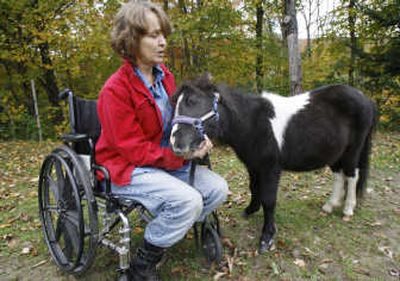Guide horse in apartment no big deal, woman protests

MONTPELIER, Vt. – Patty Cooper’s landlord normally welcomes tenants who use animals to help them get around, such as guide dogs for the blind.
So after the disabled woman bought a 32-inch-tall miniature horse to pull her wheelchair, she asked to keep the animal in her home. When her landlord rejected the request, she filed a human rights complaint.
Cooper, 50, paid $1,000 for the 1-year-old gelding named Earl, expecting to use him for trips to the bus stop and into town. The agency that owns the apartment complex in Waitsfield denied her proposal, citing concern about horse droppings, hay storage and lack of grazing space.
Cooper insists the 100-pound tobiano pinto can be house-trained and said it “just makes me so happy whenever I’m around him. I’m not lonely anymore.”
The landlord has told Cooper the horse would have to be kept elsewhere – not in the 4-by-6 stall she designed in her living room. For now, Earl is staying at a farm owned by a friend in neighboring Warren, where Cooper visits and trains him.
Cooper, 50, has celiac disease, a disorder in which exposure to a protein called gluten destroys the ability of the small intestine to absorb nutrients and can cause brittle bones. She broke her back for a second time four years ago and uses a wheelchair most of the time.
Preston Jump, executive director of the Central Vermont Community Land Trust, which owns the apartment building, acknowledged that using miniature horses as service animals is accepted practice for many disabled people. But the agency is weighing the specifics of Cooper’s request, particularly whether Earl could be trained to relieve himself only when taken outside every three hours.
Also, the apartment complex has no place to graze a horse, according to operations manager Michael Lorraine, who cited advice from the Kittrell, N.C.,-based Guide Horse Foundation, which suggests guide horses stay outside when they are not working.
Cooper said she has filed a complaint with the Vermont Human Rights Commission charging that the land trust has denied her the “reasonable accommodation” she’s due by law as a disabled person.
Robert Appel, executive director of the Human Rights Commission, would not say whether such a complaint was filed. Complaints are confidential unless the panel finds grounds to believe that discrimination occurred.